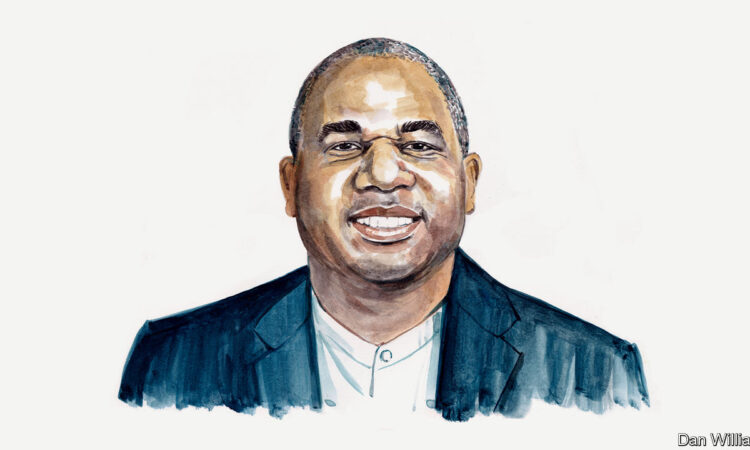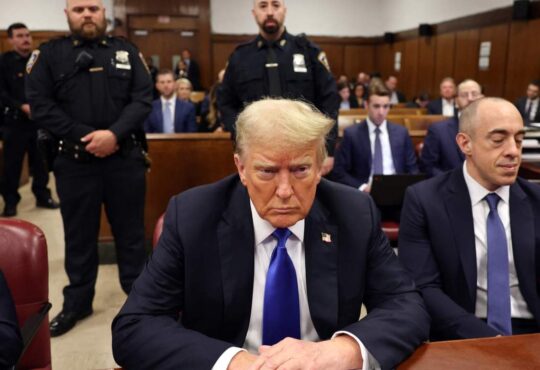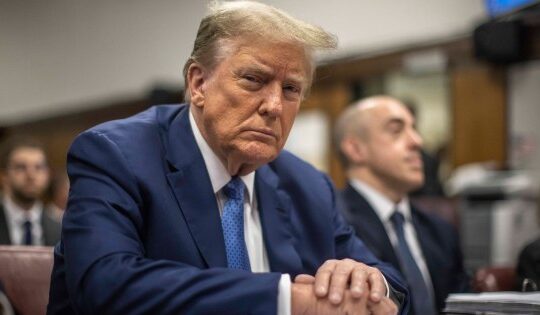
IN INTERNATIONAL POLITICS, as in the domestic sort, change comes from seizing opportunities. One may present itself in 2024 after Britain and America hold elections. After a disastrous defeat in 2019, we in Britain’s Labour Party will never be complacent about the amount of work needed to convince British voters to back us in the next general election. But with Keir Starmer’s leadership, we have our best opportunity to win since we lost power in 2010.
There is no room for complacency in America either, but President Joe Biden is well-placed to win a second term. Polls show he is likely to beat at least one of the Republican favourites—Donald Trump. Imagine the potential of a progressive moment that hinges on Mr Starmer’s presence in Downing Street and Mr Biden’s in the White House. The pair could enact policy on decarbonisation, global kleptocracy and security. Instead of familiar rhetoric about the “special relationship”, this political coming-together could offer a real and renewed problem-solving partnership on the world stage.
Our shared history shows how effective partnerships between Britain and America can be. In 1998 a Labour prime minister and a Democratic president helped forge the Good Friday Agreement and deliver peace in Northern Ireland. As I have found on recent visits to Washington, DC, when it comes to foreign policy, today’s Democrats and Labour again share a common outlook. President Biden has been loud and clear that the traditional boundary between foreign and domestic politics has broken down.
We see this clearly in Ukraine. Decades of transnational kleptocracy, often linking British and American entities to corrupt oligarchs, undermined Ukraine and empowered Russia. Now the war has contributed to rising energy bills, rocketing inflation and the largest refugee flows in Europe since the second world war. Domestic reform—such as decarbonisation to reduce reliance on imported energy—that builds resilience and closes down the means of foreign interference and manipulation is vital to foreign policy. But success in foreign policy also unlocks domestic prosperity. Democrats and Labour agree on this point.
The costs of ignoring this truth have been evident in Britain for the past 13 years, as failures at home have diminished our nation’s weight on the world stage. Successive disastrous governments took Britain out of the European Union without finding a new, settled and confident position for the country in Europe. They left the country’s reputation for upholding the rule of law tarnished because of the fiasco over the Northern Ireland protocol. They also squandered Britain’s leadership in international development and ducked significant climate action. Where America under Mr Biden has seemed a leader, Britain has felt like a laggard. The one exception is our support for Ukraine, which has been a reminder that Britain can still play a leadership role when it works in co-operation with its allies.
Labour looks at America and sees a progressive government taking action. We are inspired—not unnerved like the Conservatives—when we look at the Inflation Reduction Act (IRA), Mr Biden’s flagship policy. It includes $370bn in new spending and tax breaks to tackle climate change. We also admire the CHIPS Act, which provides $52bn in subsidies for American chip manufacturers. Labour can see that these are the kind of policies we need to make a transition to a new economy that is both clean and prosperous. They will increase research, development and innovation, and reduce the cost of energy. Under the current Conservative government, Britain is falling behind. While America and the EU invest billions, the British government has allocated less than £1m ($1.2m) for a research project on semiconductors, and lacks anything like a clear green industrial strategy.
A Labour government will turn this on its head. At home our Green Prosperity Plan will invest in the climate-friendly industries of the future. It is our answer to Mr Biden’s era-defining IRA. The Green Prosperity Plan is as ambitious as its American counterpart. It aims to decarbonise electricity by 2030 and to create more than 1m jobs. Abroad, we will seek to build a clean power alliance of developed and developing nations committed to 100% clean power by 2030—an inverse Opec, if you will. In government we will seek further green co-operation with America and the EU to propel growth. In this way we hope to gain access to, and not spurn, the IRA’s subsidies, as the EU is currently negotiating to do for critical minerals used in electric cars. Labour has the ambition to do the same for Britain.
The “progressive moment” that Labour hopes to seize could also tackle what has become a great source of global shame for Britain under the Conservatives: kleptocracy. Neglecting to enforce existing laws and to install new systems to detect money-laundering, the Conservatives have let London homes become the trinkets of kleptocrats. Dirty money flowing from Russia and other authoritarian states has led to corruption, bribery and the financing of international crime. It should not have taken the war in Ukraine for the government to put forward an economic-crime bill. Labour was calling for one long before Mr Putin’s invasion and, like so much existing law, it will mean little without a proper enforcement strategy at home and abroad. Labour backs calls from American senators Sheldon Whitehouse and Jeanne Shaheen for the establishment of a new Transatlantic Anti-Corruption Council.
We want to go further. In Labour’s first year in office, we will invite all the foreign and interior ministers from “five eyes” (an intelligence pact between America, Britain, Canada, Australia and New Zealand) and the EU to London to develop a common strategy and platform to co-ordinate how best to money-laundering, influence-buying and economic crime. With such help we will clean up the London laundromat and defeat cronyism. The exercise will be a perfect example of where foreign and domestic politics meet.
Labour will never neglect security, either. As bloody war continues to rage in Ukraine, our commitment to NATO is unshakable. Remember that it was a Labour foreign secretary, Ernest Bevin, who was behind NATO’s creation 70 years ago. But we recognise that with worrying developments in the Indo-Pacific, and an increasingly aggressive China, Europe must develop more capacity to defend itself. Britain must take a lead in this process. We will pursue a new UK–EU security pact to complement our NATO ties alongside our commitment to AUKUS. By strengthening European security, we enhance the capacity of the whole NATO alliance. That in turn will free America to deal with other threats around the world.
No matter the party or the president, America will remain Britain’s single most important bilateral relationship. The question is how dynamic our common project will be. A progressive transatlantic moment in 2024 could form the core of a broader coalition. In 2024 all “five eyes” countries, as well as critical partners such as Germany and France, could be run by centre-left or liberal governments. If Britain bickers less with Europe, our group will be stronger overall. This is why Labour’s strategy is named “Britain Reconnected.” Labour will bring Britain back to the world stage and offer to help America. We should be solving our allies’ problems, not causing them new ones. ■
David Lammy is the shadow foreign secretary. He is the Labour MP for Tottenham.






